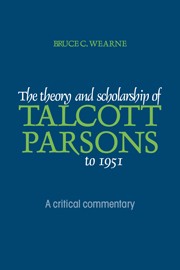Book contents
- Frontmatter
- Contents
- Preface
- Part 1 Unravelling Talcott Parsons' theoretical development
- Part 2 Talcott Parsons: the roots of his thought
- Part 3 The development of theory
- 4 Max Weber and the vision of a unified social science
- 5 The position and prospects of sociology at Harvard in the 1930s
- 6 Convergence and its construction
- Part 4 The theory
- Part 5 Parsons' theory as it stood at 1951
- Appendix Some recent publishing on Talcott Parsons' theory: a bibliographical essay
- List of references
- Index of names
- Index of Parsonian concepts
4 - Max Weber and the vision of a unified social science
Published online by Cambridge University Press: 05 February 2012
- Frontmatter
- Contents
- Preface
- Part 1 Unravelling Talcott Parsons' theoretical development
- Part 2 Talcott Parsons: the roots of his thought
- Part 3 The development of theory
- 4 Max Weber and the vision of a unified social science
- 5 The position and prospects of sociology at Harvard in the 1930s
- 6 Convergence and its construction
- Part 4 The theory
- Part 5 Parsons' theory as it stood at 1951
- Appendix Some recent publishing on Talcott Parsons' theory: a bibliographical essay
- List of references
- Index of names
- Index of Parsonian concepts
Summary
Taking bearings
When Parsons was ‘converted’ from biological to social science in Walton Hamilton's economics course, the problem of capitalism and the structure of western society were the central issues. Within the modern world some societies had greater links with their past than others, and at the back of the institutional critique of economics was the way in which American scholars appropriated European intellectual developments. This is a most important dimension of our attempt to appraise Parsons' reasons for neglecting the American theoretical developments which had emerged prior to his own discovery of Max Weber.
Seckler points out that the institutionalist critique emerged against the background of Historismus and Methodenstreit, and the appropriation of the legacy of the German historical scholarship in the American context. Seckler goes on to point out that the misidentification of institutionalism with Historismus has meant that much of the criticism of Veblen simply missed the mark.
The importance of the historical school (i.e. the German Historical School and its American followers) lies not in its real but rather in its imputed influence. When Veblen published his attack on mainstream economics, … [he] seemed to be advocating an even more pernicious doctrine than the specific Historismus in economics. It sounded like Hegel and the philosophy of history … Veblen had utter contempt both for the historical school of economics and for the philosophy of history. Indeed, he was one of their most formidable critics. Yet the conjuncture of his writings with these controversies caused him to be indelibly identified with both.
(Seckler 1975: 19–20)- Type
- Chapter
- Information
- The Theory and Scholarship of Talcott Parsons to 1951A Critical Commentary, pp. 41 - 60Publisher: Cambridge University PressPrint publication year: 1990



